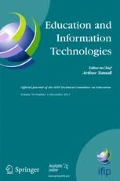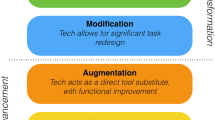Abstract
Across the world the digital era has proven to transform most education processes and systems. Yet along with this new development a challenge has been how most developing countries including Tanzania can benefit from the digital era while avoiding its downsides in education systems. Through the integrative literature review, the article draws on the recent increasing use of digital technologies among education systems in developing countries. While understanding the infrastructural and resource challenges in the region, the paper seeks to address the knowledge gap related to the digital technology in education by pointing out both the problematic areas and the promising approaches to be adapted in the efforts to harness advantages of digital technology in education processes. It is recommended in this paper that the decision to either use a particular strategy in addressing the technology gap or not, needs to be done carefully so that a particular technology for use is not blindly adopted, rather guided by research evidence that demonstrates productive and counter-productive approaches to technology in use.
Similar content being viewed by others
References
Accilar, A. (2011). Exploring the aspects of digital divide in a developing country. Issues in Informing Science and Information Technology, 8(1), 231–244.
Brown, J. S. (2000). Growing up digital: How the web changes work, education, and the ways people learn. Change: The Magazine of Higher Learning, 32(2), 11–20. https://doi.org/10.1080/00091380009601719.
Cantoni, L., & Tardini, S. (2010). Generation Y, digital learners, and other dangerous things [special issue]. QWERTY - Interdisciplinary Journal of Technology, Culture and Education, 5(2), 11–25.
European Commission (2014). Education in Digital Era. Retrieved from http://openeducationeuropa.eu/en/edu-in-digital-era on 23rd June, 2017.
Gee, J. P. (2013). The anti-education era: Creating smarter students through digital learning. New York: Palgrave/Macmillan.
Georgsen, M., & Zander, P-O. (Eds.) (2013). Changing education through ICT in developing countries. Aalborg Universitetsforlag.
Griffin, P., & Care, E. (Eds.). (2015). Assessment and teaching of 21st century skills. Methods and approaches. Dordrect: Springer.
Hamilton, D. W., & Torraco, R. J. (2013). Integrative review of the literature on adults with limited education and skills and the implications for human resource development. Human Resource Development Review, 12(3), 308–328. https://doi.org/10.1177/1534484312471135.
Hilbert, M. (2011). The manifold definitions of the digital divide and their diverse implications for policy responsibility. Arlington: Universal Access Policy TPRC.
Hull, G. A., & Nelson, M. E. (2005). Locating the semiotic power of multimodality. Written Communication, 22, 224–261. https://doi.org/10.1177/0741088304274170.
Jelfs, A., & Richardson, J. T. E. (2013). The use of digital technologies across the adult life span in distance education. British Journal of Educational Technology, 44(2), 338–351.
Kolikant, Y. B. (2010). Digital natives, better learners? Students’ beliefs about how the internet influenced their ability to learn. Computers in Human Behavior, 26(6), 1384–1391.
Littlejohn, A., Beetham, H., & McGill, L. (2012). Learning at the digital frontier: a review of digital literacies in theory and practice. Journal of Computer Assisted Learning, 28(6), 547–556. https://doi.org/10.1111/j.1365-2729.2011.00474.x.
McFarlane, A. (2015). Authentic learning for the digital generation. Realising the potential of technology in the classroom. London, UK: Routledge.
Miah, M., & Omar, A. (2012). Technology advancement in developing countries during digital age. International Journal of Science and Applied Information Technology, 1(1), 30–38.
O’Mara, J., Blackmore, J. A., Laidlaw, L., Lynch, J. & Sumara, D. J. (2015). Digital technology policies in Canada and Australia: An analysis of new rules for ‘new tech’. Proceedings from AERA2015 conference, Chicago, USA, April 16–April 20 2015.
Peterson, P. (2012). In the digital world, every district can compete with every other. Education Next, February 9, 2012. Accessed on 20th November 2016 from http://educationnext.org/in-the-digital-world-every-district-can-compete-with-every-other/.
Prensky, M. (2012). From digital natives to digital wisdom. Hopeful essays for 21st century. Thousand Oaks: Corwin Press.
Rapetti, E. (2012). LoDE: Learners of Digital Era (Doctoral dissertation). UniversitàdellaSvizzeraitaliana. Accessed on 30th November 2016 from: http://doc.rero.ch/record/30474.
Scott, D. (2012). Can States and school districts cut costs through digital learning? Governing Magazine, January 17, 2012. Accessed from http://www.governing.com/blogs/view/can-states-schooldistricts-cut-costs-through-digital-learning.html on 20th November 2016.
Souza, M. T. D., Silva, M. D. D., & Carvalho, R. D. (2010). Integrative review: What is it? How to do it? Einstein (São Paulo), 8(1), 102–106.
Thirunarayanan, M. O., Lezcano, H., McKee, M., & Roque, G. (2011). “Digital nerds” and “digital normal”: Not “digital natives” and “digital immigrants”. International Journal of Instructional Technology and Distance Learning, 8(2), 25–33.
Torraco, R. J. (2005). Writing integrative literature reviews: Guidelines and examples. Human Resource Development Review, 4, 356–367.
Whittemore, R., & Knafl, K. (2005). The integrative review: Updated methodology. Journal of Advanced Nursing, 52(5), 546–553.
Author information
Authors and Affiliations
Corresponding author
Additional information
Publisher’s Note
Springer Nature remains neutral with regard to jurisdictional claims in published maps and institutional affiliations.
Rights and permissions
About this article
Cite this article
Kalolo, J.F. Digital revolution and its impact on education systems in developing countries. Educ Inf Technol 24, 345–358 (2019). https://doi.org/10.1007/s10639-018-9778-3
Received:
Accepted:
Published:
Issue Date:
DOI: https://doi.org/10.1007/s10639-018-9778-3




